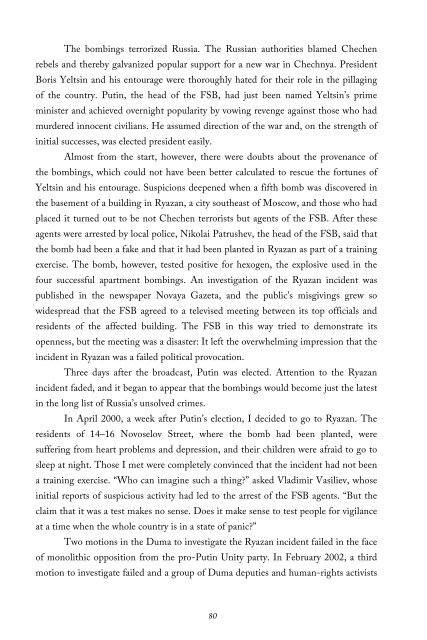You also want an ePaper? Increase the reach of your titles
YUMPU automatically turns print PDFs into web optimized ePapers that Google loves.
The bombings terrorized Russia. The Russian authorities blamed Chechen<br />
rebels and thereby galvanized popular support for a new war in Chechnya. President<br />
Boris Yeltsin and his entourage were thoroughly hated for their role in the pillaging<br />
of the country. Putin, the head of the FSB, had just been named Yeltsin’s prime<br />
minister and achieved overnight popularity by vowing revenge against those who had<br />
murdered innocent civilians. He assumed direction of the war and, on the strength of<br />
initial successes, was elected president easily.<br />
Almost from the start, however, there were doubts about the provenance of<br />
the bombings, which could not have been better calculated to rescue the fortunes of<br />
Yeltsin and his entourage. Suspicions deepened when a fifth bomb was discovered in<br />
the basement of a building in Ryazan, a city southeast of Moscow, and those who had<br />
placed it turned out to be not Chechen terrorists but agents of the FSB. After these<br />
agents were arrested by local police, Nikolai Patrushev, the head of the FSB, said that<br />
the bomb had been a fake and that it had been planted in Ryazan as part of a training<br />
exercise. The bomb, however, tested positive for hexogen, the explosive used in the<br />
four successful apartment bombings. An investigation of the Ryazan incident was<br />
published in the newspaper Novaya Gazeta, and the public’s misgivings grew so<br />
widespread that the FSB agreed to a televised meeting between its top officials and<br />
residents of the affected building. The FSB in this way tried to demonstrate its<br />
openness, but the meeting was a disaster: It left the overwhelming impression that the<br />
incident in Ryazan was a failed political provocation.<br />
Three days after the broadcast, Putin was elected. Attention to the Ryazan<br />
incident faded, and it began to appear that the bombings would become just the latest<br />
in the long list of Russia’s unsolved crimes.<br />
In April 2000, a week after Putin’s election, I decided to go to Ryazan. The<br />
residents of 14–16 Novoselov Street, where the bomb had been planted, were<br />
suffering from heart problems and depression, and their children were afraid to go to<br />
sleep at night. Those I met were completely convinced that the incident had not been<br />
a training exercise. “Who can imagine such a thing?” asked Vladimir Vasiliev, whose<br />
initial reports of suspicious activity had led to the arrest of the FSB agents. “But the<br />
claim that it was a test makes no sense. Does it make sense to test people for vigilance<br />
at a time when the whole country is in a state of panic?”<br />
Two motions in the Duma to investigate the Ryazan incident failed in the face<br />
of monolithic opposition from the pro-Putin Unity party. In February 2002, a third<br />
motion to investigate failed and a group of Duma deputies and human-rights activists<br />
80



